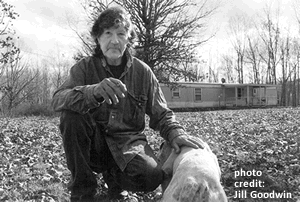A Duty to Language
The purpose of a writer, for William Gay, was taking notes and recording the world
His books line a shelf at my home, and one of his landscapes hangs on a wall in my living room, and while those tangible objects—permanent in their own perfection—are sources of comfort in this period of loss, the intangible is what I already miss about my friend William Gay: phone calls, conversations, hilarious anecdotes on road trips, an encyclopedic knowledge of literature and music, all delivered in his unmistakable Tennessee drawl.
I’ve actually warned my students that they might not understand a word William said until they allowed themselves to be swept along by the particular cadence of his voice. But once they found that rhythm, something clicked like tumblers in a lock, and he charmed them all.
 William never turned down an invitation to visit my classes at Middle Tennessee State University. While uncomfortable before large crowds at readings, he seemed to relish the opportunity to talk with students about his work and creative process, and had a way about him that put them at ease and made them feel their questions were important, that their opinions about his stories and novels mattered. For most of them, William was the first flesh-and-bone writer they’d ever met, and the experience was profound and memorable.
William never turned down an invitation to visit my classes at Middle Tennessee State University. While uncomfortable before large crowds at readings, he seemed to relish the opportunity to talk with students about his work and creative process, and had a way about him that put them at ease and made them feel their questions were important, that their opinions about his stories and novels mattered. For most of them, William was the first flesh-and-bone writer they’d ever met, and the experience was profound and memorable.
And yet, after every classroom visit—at least a half dozen—he always asked me, “Was that alright? Do you think it went well?” Those questions speak volumes about the man. William was genuine, unassuming, and humble—a rare combination of qualities in anyone, but especially in someone who possessed so many extraordinary gifts. He was always surprised when recognized in public, and I don’t think he ever quite accepted how valuable his work was or how far-reaching his literary influence.
Before his final trip to MTSU, William had just been asked by The Folio Society of London to write an introduction to their special edition of William Faulkner’s novel As I Lay Dying. He told me on the phone: Let’s talk about the novel on the ride to school. I knew I would have nothing to add that he hadn’t already contemplated, but it would be edifying to hear him organize his thoughts. I was his sounding board and learned more in a few hours than I ever did in a graduate seminar. I think he was honored to have been asked and was proud of that introduction—and he should have been: anyone who reads or re-reads Faulkner’s masterpiece should first savor William’s words. For a self-described non-academic, William’s commentary on As I Lay Dying is as sound as any criticism I’ve ever read.
On another visit to MTSU, William sat on a panel with poets Wyatt Prunty and Jeff Hardin, and short-story writer Tamara Baxter. He offered these thoughts that evening: “The purpose of an artist—whether it’s a writer, a poet, a musician—is taking notes; they record the world and then put their own spin of truth on it. The truth is the main element in art. I see my role as having a duty to the language, using the language as well as I can, and just finding every now and then something true.”
In every experience I had with William—in every line of his I’ve read and every conversation I was privileged to enjoy—the truth was always there: in his dutiful attention to language, in his riveting imagery, in his characters and their spot-on dialogue, in that painting at home, and in those books that we can return to when we’re seeking our own truths.
Randy Mackin is the author of George Scarbrough, Appalachian Poet, an associate professor of English at Middle Tennessee State University, and director of the Tennessee Literary Project. He lives in Linden, Tennessee.

